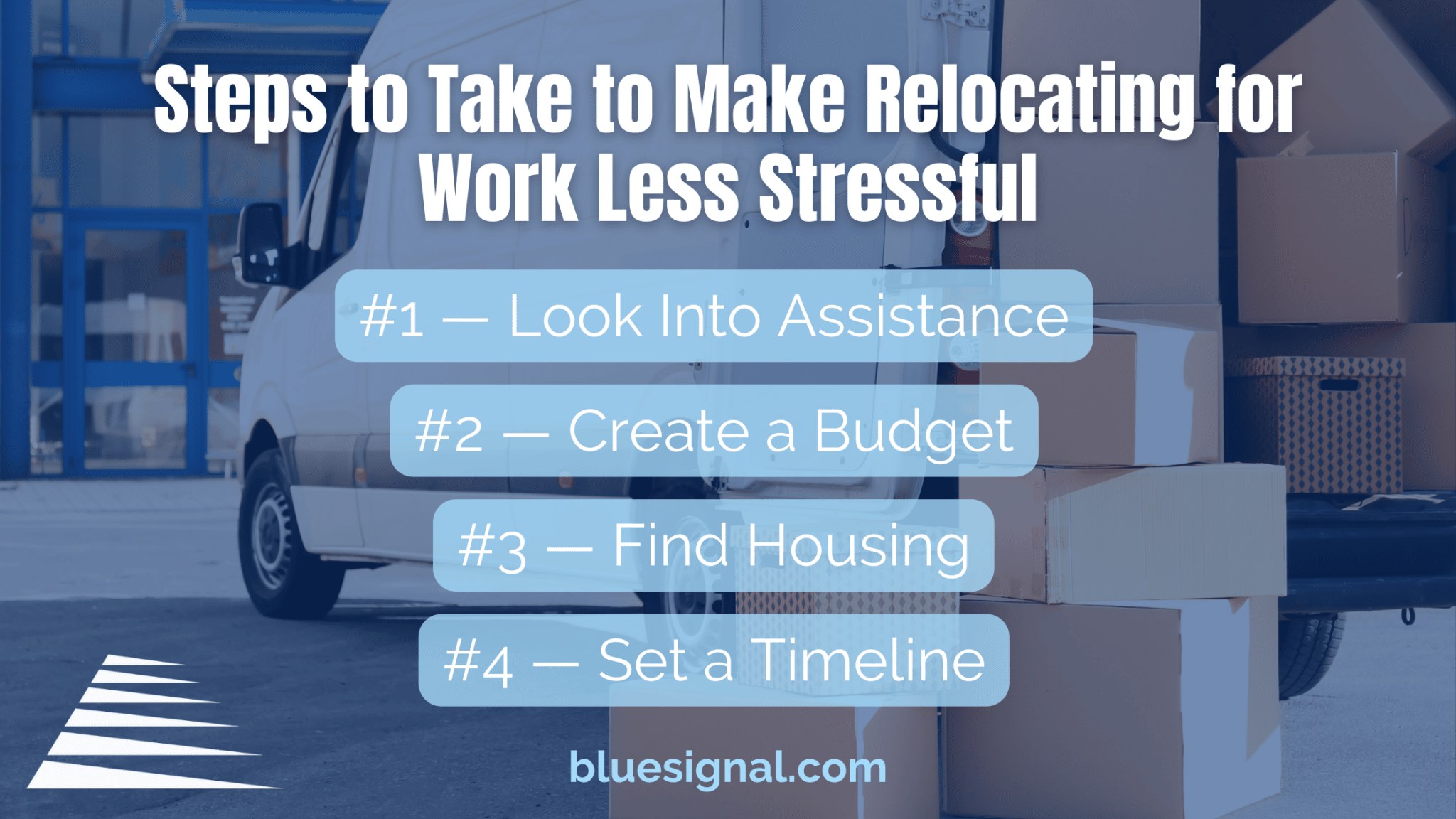Although remote work has become a norm for many people post-pandemic, others still work in-person and may relocate for certain positions. In fact, 16% of Americans moved for work-related reasons in 2021 despite COVID-19. As more people are moving jobs and advancing their careers with different companies, job hunters are on the search for new opportunities – which may result in relocation. Starting a position in a new area can often be just as stressful as it is exciting; there are a lot of details to consider! To help you on this journey, here are some steps you can take to make relocating for work a breeze.
#1 – Look Into Assistance
Relocating for work is no small feat. It’s often a complex process that requires a lot of time, money, and organization. When you’re in the process of finalizing your job offer, it’s important to research your options and find out what type of assistance your company offers for those relocating. Many companies provide some sort of relocation assistance or benefits, and the terms are often flexible. They might reimburse you for moving-related costs, cover the cost of trips to visit your new location, provide moving services, offer help to sell or buy a home, and more. If you’re married, they may even help your spouse find a new position in your location as an added incentive.
If your company doesn’t offer any aid, you can try negotiating for some assistance to help with the transition. At the job offer stage, you can be rest assured they see you as a valuable asset to their team, so they’re more likely to be flexible. To make your case more convincing, research the costs associated with relocating beforehand – including the new cost of living in your location, median income for your role in the region, etc. – so you can explain where the money would be allocated. Here, you can leverage your recruiter to present market insights and comparable relocation packages from similar companies. Giving your future employer a detailed estimate of expenses is crucial in getting them to accept your request. If you’re successful, ask about preferred providers and any criteria for covered expenses. Remember, even if you aren’t able to negotiate relocation assistance, you may be able to get a signing bonus, a higher salary, or even a flexible schedule to make the transition easier and to offset the costs.
#2 – Create a Budget for Relocating
Moving can be expensive, so calculating the expected costs of relocating and determining how much you can afford to spend will help keep your finances organized and prevent you from overspending. Before you relocate, create a budget to track your spending and keep yourself accountable. As mentioned earlier, this budget will also come in handy when asking your company for relocation assistance.
In your budget, include the cost of moving supplies, transportation, meals, professional moving and packing services, the adjusted cost of living, housing deposits, and more. If your current home needs repairs and touch ups to make selling easier, account for those expenses as well. Estimating these costs ahead of time will help make the relocation process less stressful and ensure you’re prepared for a successful move.

#3 – Find Housing
Aside from getting your job offer, another important aspect in relocating for work is finding a place to live. There’s a lot that goes into buying a new home, especially on top of starting a new job, but creating a list of your wants and needs can help narrow your search. Look into the best cities for job seekers, and do extensive research on your new location to determine what neighborhoods would suit your budget and lifestyle the best. For instance, if you have children and pets you may want to live in a more suburban location with a big yard. However, if you’re single and want to be near the bustle of restaurants and bars, you may want to live closer to the city.
Along with these details, make sure to consider the length of your commute to the office, the cost of living, safety, proximity to stores, school districts, and more. If possible, try to visit the place you're moving to at least once before committing to get more familiar with the area and to get a closer look at potential neighborhoods and homes. Your company may even provide you with temporary housing so you can explore the area more without having to rush into buying a home. When considering housing options, you’ll also want to create a budget for your new home to see what you can comfortably afford. Researching financial requirements such as home loan rates, the minimum down payment amount, and the process to get a mortgage will help make the house hunting process much more efficient. This will help you be more prepared and can help your real estate agent find homes that are suitable for your needs and finances.
#4 – Set a Timeline for Relocating
There’s a lot to manage during a job relocation. To make this transition easier, it’s important to plan ahead, stay organized, and create a realistic timeline for your move. The amount of time you have in between the end of your current position and your new role may vary depending on your situation, but either way it’s best to start preparing as soon as possible. If you need more time, you may be able to negotiate for a later start date if you’re moving a long distance.
In general, you should try to move into your home before starting your new job so you have enough time to get familiar with the location and get situated in your space. With this in mind, you’ll want to dedicate time to sell your current home and purchase a new one, while also making appointments with moving companies and packing. Depending on how far your move is, you may also want to plan a few visits to your new location to get a better feel of the neighborhoods and surrounding areas. Whatever tasks you need to complete, consider making a detailed checklist to keep track of everything and assign them deadlines so you stay on schedule. As long as you’re proactive and split up tasks over time, your job relocation will be a breeze.
With the help of professional recruiters, research, and preparation, relocating for work will be an exciting milestone in your career rather than a hassle. As long as you advocate for your needs and plan ahead, you’ll be set up for a successful personal and professional move. If you need help navigating the job relocation process, reach out today to Blue Signal’s talent acquisition professionals.









